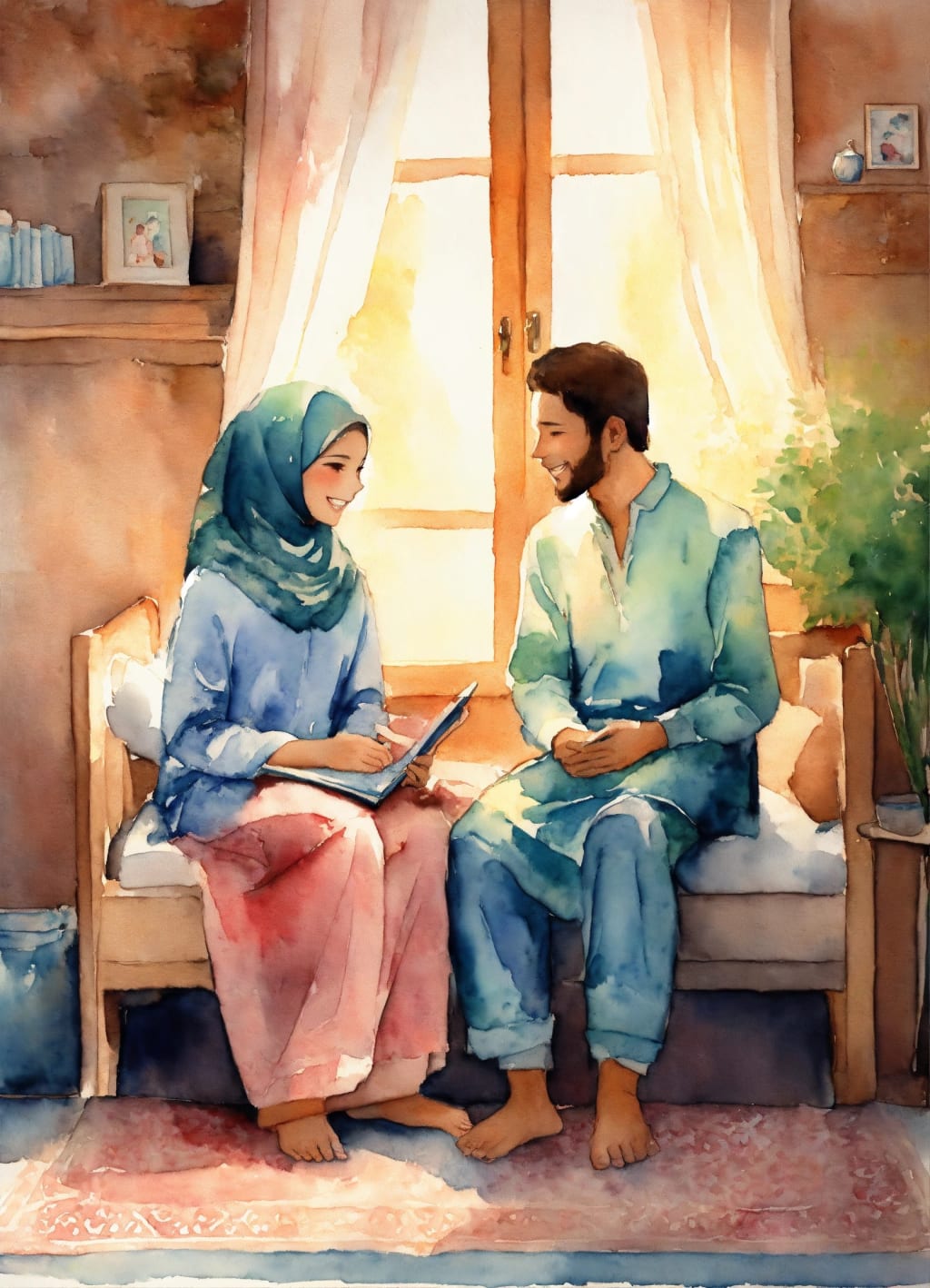From Prejudice to Gratitude
A Story of Transformation

Abdul, Fatima, and their two young children, Samir and Aisha, fled the war-torn streets of their homeland with nothing but the clothes on their backs and a heart full of hope. America, the land of opportunity, awaited them. Yet, their fresh start in a quiet suburban neighborhood wasn't as welcoming as they imagined. Mr. Henderson, a grumpy widower next door, took one look at their unfamiliar skin and clothes, his face contorting in disgust.
From day one, Mr. Henderson made their lives difficult. He'd glare at them over the fence, mutter insults under his breath, and complain about "strange smells" coming from their house (it was just Fatima's delicious Syrian cooking). He even put up a garish sign on his lawn that read, "Go back to where you came from!"
Abdul, a gentle soul who had witnessed the worst humanity had to offer, tried to ignore Mr. Henderson's bigotry. Fatima, however, bristled. "We will not let him bully us," she'd say, her voice firm. The children, despite not fully understanding the situation, sensed the tension and clung to their parents a little tighter.
One blustery winter night, a snowstorm raged outside. Power lines snapped, plunging the neighborhood into darkness. Inside the Henderson house, Mr. Henderson, bundled in layers, shivered by the dying embers of his fireplace. A sharp pain shot through his chest, followed by a terrifying tightness in his breath. He clutched his heart, gasping for air.
Alone and scared, Mr. Henderson stumbled outside, hoping to reach his neighbor for help. But the storm was relentless, the wind whipping snow into his face, blurring his vision. He collapsed on his porch, his world fading to black.
Meanwhile, Abdul, ever the handyman, had managed to rig a lantern using car batteries. Fatima, ever the nurturer, brewed a pot of hot tea. Suddenly, a frantic pounding on the door startled them. It was Samir, pointing excitedly at the fallen figure next door.
Fatima, a doctor in her war-torn homeland, understood immediately. "It's a heart attack," she said, her voice calm despite the urgency. Together, Abdul and Fatima braved the storm, rushing to Mr. Henderson's side.
Using her training and the meager medical supplies they'd brought, Fatima stabilized Mr. Henderson. Abdul, strong and resourceful, fashioned a makeshift stretcher from a rug and carried him inside their warm house. For hours, they worked tirelessly, monitoring him, keeping him warm until the ambulance, finally able to navigate the treacherous roads, arrived.
The next morning, Mr. Henderson awoke in a hospital bed, a groggy mix of gratitude and shame washing over him. When he saw Abdul and Fatima sitting beside him, their faces etched with concern, his heart ached. "You saved my life," he rasped, his voice weak.
Tears welled up in Fatima's eyes. "We are all human beings, Mr. Henderson," she said softly. Shamefaced, Mr. Henderson looked at the kind faces before him. He saw not strangers, but his saviors.
When Mr. Henderson returned home, the "Go back" sign was gone, replaced with a hand-painted welcome sign in broken Arabic, a testament to his newfound respect for his neighbors. He became a fierce advocate for refugees, sharing his story and dispelling prejudices.
The once-divided neighborhood transformed. Mr. Henderson became a beloved "Uncle George" to Samir and Aisha. The delicious smells of Syrian cooking now wafted through the entire neighborhood, a symbol of community and acceptance. Abdul and Fatima, who had arrived seeking refuge, found a home, not just a place, but a place where kindness triumphed over hate.
Regenerate drafts
Abdul, Fatima, and their two young children, Samir and Aisha, fled the war-torn streets of their homeland with nothing but the clothes on their backs and a heart full of hope. America, the land of opportunity, awaited them. Yet, their fresh start in a quiet suburban neighborhood wasn't as welcoming as they imagined. Mr. Henderson, a grumpy widower next door, took one look at their unfamiliar skin and clothes, his face contorting in disgust.
From day one, Mr. Henderson made their lives difficult. He'd glare at them over the fence, mutter insults under his breath, and complain about "strange smells" coming from their house (it was just Fatima's delicious Syrian cooking). He even put up a garish sign on his lawn that read, "Go back to where you came from!"
Abdul, a gentle soul who had witnessed the worst humanity had to offer, tried to ignore Mr. Henderson's bigotry. Fatima, however, bristled. "We will not let him bully us," she'd say, her voice firm. The children, despite not fully understanding the situation, sensed the tension and clung to their parents a little tighter.
One blustery winter night, a snowstorm raged outside. Power lines snapped, plunging the neighborhood into darkness. Inside the Henderson house, Mr. Henderson, bundled in layers, shivered by the dying embers of his fireplace. A sharp pain shot through his chest, followed by a terrifying tightness in his breath. He clutched his heart, gasping for air.
Alone and scared, Mr. Henderson stumbled outside, hoping to reach his neighbor for help. But the storm was relentless, the wind whipping snow into his face, blurring his vision. He collapsed on his porch, his world fading to black.
Meanwhile, Abdul, ever the handyman, had managed to rig a lantern using car batteries. Fatima, ever the nurturer, brewed a pot of hot tea. Suddenly, a frantic pounding on the door startled them. It was Samir, pointing excitedly at the fallen figure next door.
Fatima, a doctor in her war-torn homeland, understood immediately. "It's a heart attack," she said, her voice calm despite the urgency. Together, Abdul and Fatima braved the storm, rushing to Mr. Henderson's side.
Using her training and the meager medical supplies they'd brought, Fatima stabilized Mr. Henderson. Abdul, strong and resourceful, fashioned a makeshift stretcher from a rug and carried him inside their warm house. For hours, they worked tirelessly, monitoring him, keeping him warm until the ambulance, finally able to navigate the treacherous roads, arrived.
The next morning, Mr. Henderson awoke in a hospital bed, a groggy mix of gratitude and shame washing over him. When he saw Abdul and Fatima sitting beside him, their faces etched with concern, his heart ached. "You saved my life," he rasped, his voice weak.
Tears welled up in Fatima's eyes. "We are all human beings, Mr. Henderson," she said softly. Shamefaced, Mr. Henderson looked at the kind faces before him. He saw not strangers, but his saviors.
When Mr. Henderson returned home, the "Go back" sign was gone, replaced with a hand-painted welcome sign in broken Arabic, a testament to his newfound respect for his neighbors. He became a fierce advocate for refugees, sharing his story and dispelling prejudices.
The once-divided neighborhood transformed. Mr. Henderson became a beloved "Uncle George" to Samir and Aisha. The delicious smells of Syrian cooking now wafted through the entire neighborhood, a symbol of community and acceptance. Abdul and Fatima, who had arrived seeking refuge, found a home, not just a place, but a place where kindness triumphed over hate.





Comments
There are no comments for this story
Be the first to respond and start the conversation.